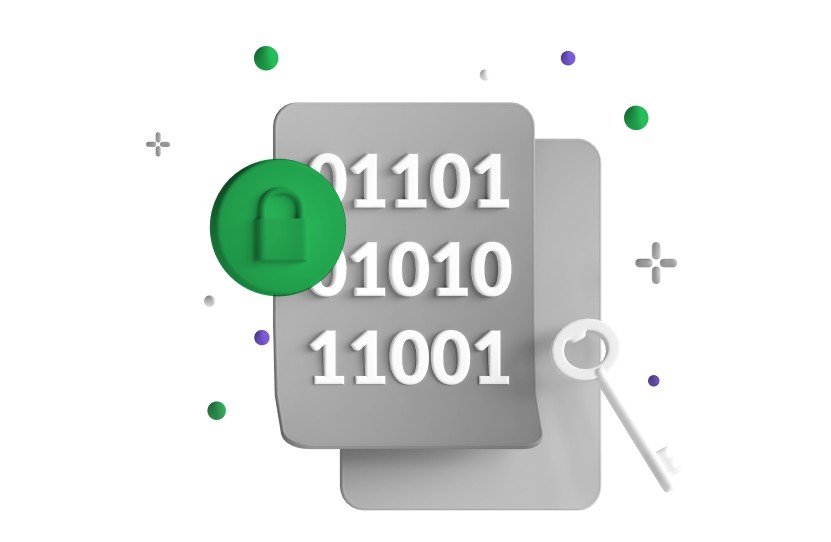EMV Payment Solutions Development
Access new profit pools by supporting contactless payments — a market of $1 trillion market, with a 20% CAGR during this decade. Explore and implement the new ecosystem of business opportunities together with Edvantis — your EMV solutions development partner.


What is EMV?
EMV, short for Europay, Mastercard, and Visa, is a joint technology standard for processing financial transactions made with chip-based payment cards or via EMV-compatible terminals. A later acronym “CO” was added as the initiative evolved into a consortium of companies.
Instead of a magnetic stripe, EMV cards use smart chips for data storage and transaction authentication. Users need to tap a PIN code input for in-person transaction validation. This element, combined with other technology infrastructure improvements, makes EMV payments more reliable and secure.
Because EMV payment processing offers better security, global card issuers actively promote its usage. Globally, some 10 billion EMV cards were already deployed and remain in active use. However, some markets trail behind in EMV adoption, which prompted the EMVCo consortium to issue a new mandate:
Depcirate magnetic card usage in the US by 2023 (with select exceptions). Moreover, the liability for card-present fraud now falls on the card-issuing bank or the merchant who chose not to use EMV payment technology.
So if you have been delaying EMV implementation, you are operating on borrowed time.

EMV Payment Tokenization
The most innovative element of EMV payment systems is payment tokenization — the process of replacing or complementing a sensitive data element (such as a card PAN number) with a non-sensitive, encrypted equivalent (a token). Payment tokenization minimizes the security risks of online transaction processing without adding extra gruesome steps for the user. This way, merchants can maintain a seamless, yet highly secure, online checkout experience.
Types of EMV Payments Transactions
EMV technology allows issuing multiple tokens for different user-enabled devices such as mobile wallets, wearable devices, or other hardware. The issued tokens can be then used for card-present and card-not-present transactions across channels — for in-app payments, in-store purchases, or online payments.
Card Transactions
with PIN
Most modern payment terminals and POS systems now support chip-based card processing. Because the users are asked to provide a PIN code for transaction validation, this way of payment processing is more secure. EMV cards are also less prone to fraud since they can’t be “swiped” or used without authorization
Contactless
Payments
EMV cards also support “tappable” contactless payments — the newly preferred payment option among consumers. Over the past two years, contactless payments volume grew by 150% — and is projected to maintain double-digit growth during this decade. From retail payments to transit ticket purchases, contactless payment use cases are on the rise.
Card-Not-Present Payments
In card-not-present (CNP) transactions the cardholder doesn’t provide a physical card to the merchant. Such transactions include NFC payments made via mobile wallets, in-app or online payments. To ensure topmost security, EMV programming assumes implementing extra security controls like SMS OTP, in-app validation, or push notifications.
Edvantis EMV Software Development Services
EMVCo is a technology standard. As such its implementation requires in-depth knowledge of the payments ecosystem as a whole, as well as specific security, compliance, and architecture requirements. Edvantis has significant expertise in payment-related projects and EMV development in particular.
EMV Payment Applications Development
Edvantis can assist you with developing new EMV payment applications or performing EMV integration into an existing product. We combine our practical experience in payment solutions development with in-depth knowledge of EMV specifications, security requirements, and quality assurance (QA) best practices.
To set you up for success, we first analyze your current payment workflows. Then offer proactive ways to meet EMV certification requirements and PCI DSS compliance requirements. To speed up the development process, our team creates modular architecture, based on industry-approved libraries, APIs, and other technical EMVCo specifications. This way we can ensure seamless interoperability with other payment systems and your future products.

EMV Certification
The payment industry has rigorous security and data protection standards. As part of our EMV development services, we provide EMV compliant software programming and testing to help you meet these standards. Our team is equipped with the expertise to ensure that your EMV software is fully compliant, secure, and reliable.

PCI SSF Compliance
PCI SSF is a 2019 update to the original PCI DSS program, due for depreciation by the end of 2022. This standard was designed specifically for software vendors and merchants, in the business of developing payment solutions. Becoming PCI SSF compliant is a crucial requirement for payment processing apps, as well as larger merchants, operating a custom payment architecture. Edvantis can help you meet the PCI SSF list of requirements for creating secure payment architecture, minimizing vulnerabilities, and adding extra safeguards against known and emerging cyber risks, as well as standards for improving the maintenance of existing payment services.

EMV Testing
Quality assurance (QA) plays a major role in EMV development. Using the right testing tools can make the EMV certification process easier in terms of time, effort, and money. Over the years, Edvantis has developed an in-depth knowledge of QA tools and automation best practices for covering various testing scenarios. We have significant experience with performing end-to-end (E2E) testing of payment solutions, covering performance, load, user interfaces, and security among other elements.

Open Loop EMV Payment Solutions Development
Open loop payment systems allow users to use any type of payment method to conduct a transaction. For example, tap a contactless card to pay for a transport ticket instead of using a public transport smart card. Edvantis helps players in every industry – from transportation to hotels – implement open-loop payment systems to reduce payment processing costs and offer greater convenience to users.


